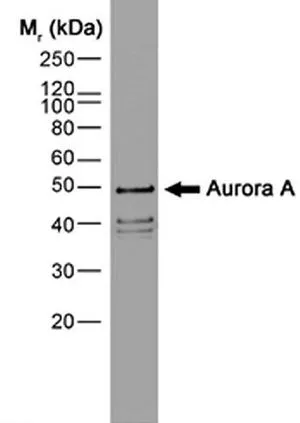
WB analysis of Aurora A kinase recombinant protein using GTX13824 Aurora A antibody
Aurora A antibody [35C1]
GTX13824
ApplicationsImmunoFluorescence, ImmunoPrecipitation, Western Blot, ImmunoCytoChemistry, ImmunoHistoChemistry, ImmunoHistoChemistry Paraffin, Other Application
Product group Antibodies
TargetAURKA
Overview
- SupplierGeneTex
- Product NameAurora A antibody [35C1]
- Delivery Days Customer9
- Application Supplier NoteWB: 1/500-1/1,000. *Optimal dilutions/concentrations should be determined by the researcher.Not tested in other applications.
- ApplicationsImmunoFluorescence, ImmunoPrecipitation, Western Blot, ImmunoCytoChemistry, ImmunoHistoChemistry, ImmunoHistoChemistry Paraffin, Other Application
- CertificationResearch Use Only
- ClonalityMonoclonal
- Clone ID35C1
- Concentration1 mg/ml
- ConjugateUnconjugated
- Gene ID6790
- Target nameAURKA
- Target descriptionaurora kinase A
- Target synonymsAIK, ARK1, AURA, BTAK, PPP1R47, STK15, STK6, STK7, aurora kinase A, aurora 2, aurora/IPL1-like kinase, aurora/IPL1-related kinase 1, breast tumor-amplified kinase, protein phosphatase 1, regulatory subunit 47, serine/threonine protein kinase 15, serine/threonine-protein kinase 6, serine/threonine-protein kinase aurora-A
- HostMouse
- IsotypeIgG2b
- Protein IDO14965
- Protein NameAurora kinase A
- Scientific DescriptionThe protein encoded by this gene is a cell cycle-regulated kinase that appears to be involved in microtubule formation and/or stabilization at the spindle pole during chromosome segregation. The encoded protein is found at the centrosome in interphase cells and at the spindle poles in mitosis. This gene may play a role in tumor development and progression. A processed pseudogene of this gene has been found on chromosome 1, and an unprocessed pseudogene has been found on chromosome 10. Multiple transcript variants encoding the same protein have been found for this gene. [provided by RefSeq, Jul 2008]
- Storage Instruction-20°C or -80°C,2°C to 8°C
- UNSPSC12352203
References
- Endosulfine alpha maintains spindle pole integrity by recruiting Aurora A during mitosis.Read more
- FOXM1-CD44 Signaling Is Critical for the Acquisition of Regorafenib Resistance in Human Liver Cancer Cells.Read more
- Aurora kinases in ovarian cancer. Perez-Fidalgo JA et al., 2020 Oct, ESMO OpenRead more
- A selective Aurora-A 5-UTR siRNA inhibits tumor growth and metastasis. Lai CH et al., 2020 Mar 1, Cancer LettRead more
- The EGF/hnRNP Q1 axis is involved in tumorigenesis via the regulation of cell cycle-related genes. Wang YC et al., 2018 Jun 6, Exp Mol MedRead more
- Structural basis of N-Myc binding by Aurora-A and its destabilization by kinase inhibitors. Richards MW et al., 2016 Nov 29, Proc Natl Acad Sci U S ARead more
- Aurora A is a prognostic marker for breast cancer arising in BRCA2 mutation carriers. Aradottir M et al., 2015 Jan, J Pathol Clin ResRead more
- Targeting megakaryocytic-induced fibrosis in myeloproliferative neoplasms by AURKA inhibition. Wen QJ et al., 2015 Dec, Nat MedRead more
- Aurora kinase A is required for hematopoiesis but is dispensable for murine megakaryocyte endomitosis and differentiation. Goldenson B et al., 2015 Mar 26, BloodRead more
- CDKN1A-mediated responsiveness of MLL-AF4-positive acute lymphoblastic leukemia to Aurora kinase-A inhibitors. Chen YP et al., 2014 Aug 1, Int J CancerRead more

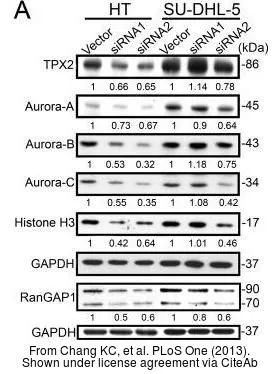
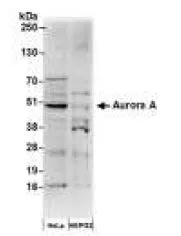
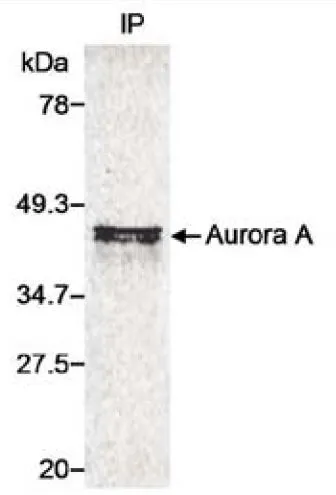

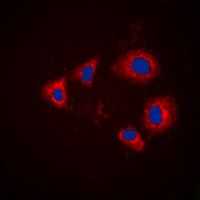
![ELISA analysis of antigen using GTX60391 Aurora A antibody [1F8]. Red : Control antigen 100ng Purple : Antigen 10ng Green : Antigen 50ng Blue : Antigen 100ng](https://www.genetex.com/upload/website/prouct_img/normal/GTX60391/GTX60391_20170912_ELISA_w_23061123_531.webp)
![ELISA analysis of antigen using GTX60392 Aurora A antibody [4G10]. Red : Control antigen 100ng Purple : Antigen 10ng Green : Antigen 50ng Blue : Antigen 100ng](https://www.genetex.com/upload/website/prouct_img/normal/GTX60392/GTX60392_20170912_ELISA_w_23061123_317.webp)